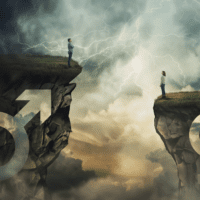Throughout history, there have been moments of profound transformation that have altered the course of human civilization. These paradigm shifts have reshaped our world, challenging old beliefs and ushering in new opportunities. From the invention of the printing press to the Industrial Revolution, these milestones have affected technology and science and influenced social and cultural…
Uncovering the Unseen: The Hidden Bias Behind Judging People
In a world where first impressions are everything, it’s easy to make snap judgments based on our biases. By taking a closer look at the hidden bias that shapes our perception and behavior, we’ll uncover how our mental shortcuts can often lead to unfair and inaccurate conclusions. Discover how your unconscious biases could affect your…
Pursue Effectiveness: Why Choosing Substance over Fame Leads to True Success
In a world obsessed with fame, it’s easy to lose sight of what truly matters: substance. Success shouldn’t be measured solely by popularity or recognition. Instead, it should be defined by our impact and being willing to pursue effectiveness and not fame. In this post, you’ll learn the importance of embracing substance and its power to…
Global Graces: Navigating Social Etiquette Across Cultures and Countries
In our interconnected world, cross-cultural interactions are increasingly common. Understanding and respecting social etiquette across cultures is essential for business, travel, or personal relationships. Learn the differences in different world regions and how to adapt your behavior to create meaningful connections and avoid unintentionally offending others. (Estimated reading time: 12 minutes) “Good manners are just…
Greatest Scientists of All Time and How They Inspire Our Ingenuity
Human society has reached where it is today because of the tireless efforts of thousands of scientists. They sacrificed their lives to alleviate human suffering and take humanity forward. While there have been many known and unknown scientists that we should thank, a few stand out because of how much their inventions and discoveries changed…
Unveiling the Timeless Wisdom: Exploring the Secrets of Ancient Civilizations
The wisdom of ancient civilizations is significantly important to our understanding of the evolution of our species. By exploring the rich tapestry of ancient worlds, we can learn valuable insights that challenge our modern perspectives and broaden our understanding of the human experience. In addition to the well-documented achievements, an intriguing range of mysteries and…
Historic Friendships: Exploring the Unbreakable Bonds That Shaped the Course of Humanity
Throughout history, there have been friendships that transcended time, culture, and even adversity. These unbreakable bonds enriched the lives of those involved and played a significant role in shaping human history. From political allies to artistic collaborators, the impact of these historic friendships is immeasurable; we’ll delve into the stories of some of these remarkable…
Objectifying People in Relationships: What it Means and Why We Need to Stop Doing it
Objectifying people in relationships means treating them as objects rather than human beings —viewing them as a means to an end without any feelings or regard for their well-being. Objectification not only hurts people but also erodes the foundation of any meaningful relationship. Learn the signs of objectifying someone and how to stop doing it…
Race and Ethnicity: Understanding the Distinctions and Celebrating the Diversity within Humanity
Race and ethnicity are often used interchangeably, but they hold distinct meanings. People’s rich and varied backgrounds contribute to the vibrant tapestry of global culture, molding traditions, customs, and artistic expressions. Knowing the difference between race and ethnicity and where they overlap is essential for celebrating diversity and creating an inclusive society. Learn what those…
Developed and Less Developed Countries: Understanding the Differences and Why it Matters
Developed or less developed countries are classified based on a complex interplay of economic, social, and political factors. According to the United Nations, this classification reflects their basic economic conditions. Understanding the differences between developed and less developed countries is essential for fostering empathy, promoting global cooperation, and working towards a more equitable world. Learn…










